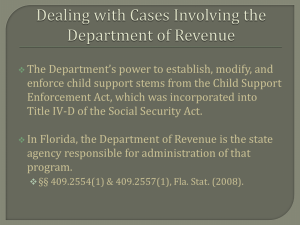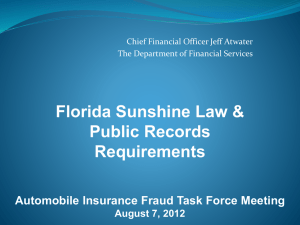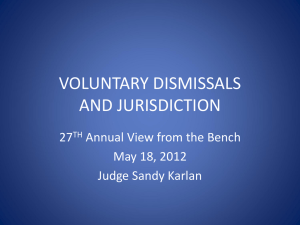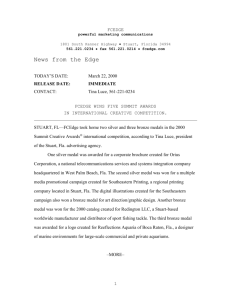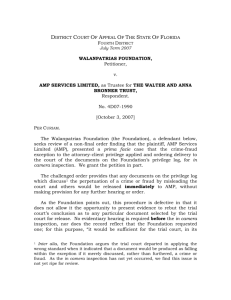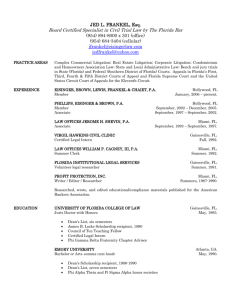Third District Court of Appeal
advertisement
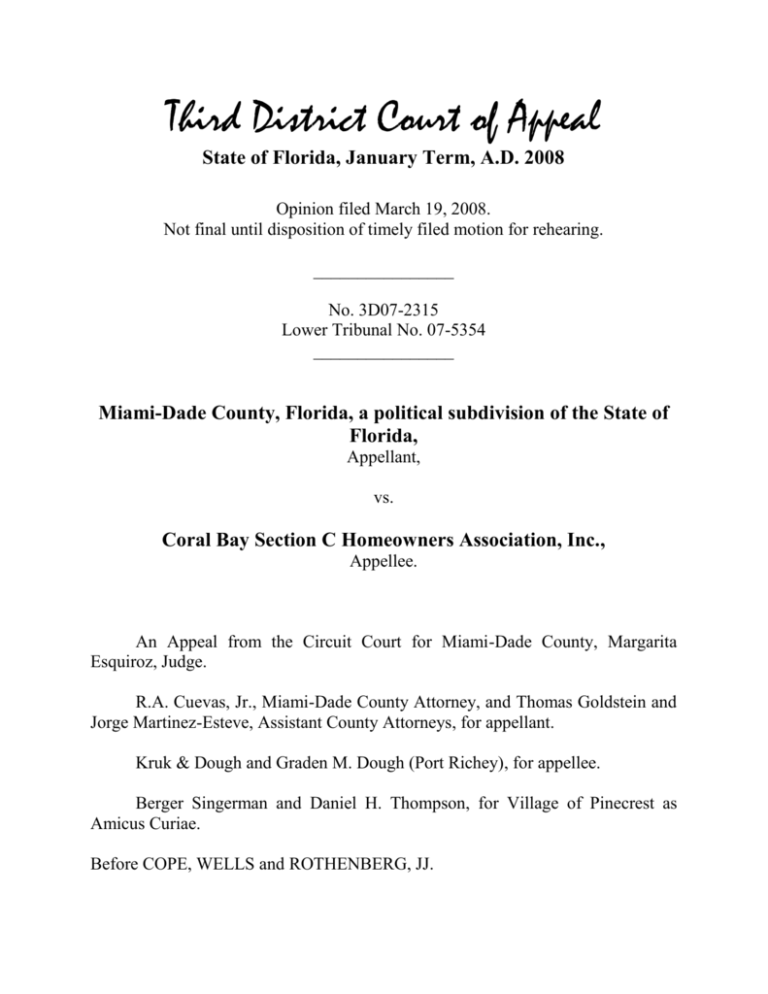
Third District Court of Appeal State of Florida, January Term, A.D. 2008 Opinion filed March 19, 2008. Not final until disposition of timely filed motion for rehearing. ________________ No. 3D07-2315 Lower Tribunal No. 07-5354 ________________ Miami-Dade County, Florida, a political subdivision of the State of Florida, Appellant, vs. Coral Bay Section C Homeowners Association, Inc., Appellee. An Appeal from the Circuit Court for Miami-Dade County, Margarita Esquiroz, Judge. R.A. Cuevas, Jr., Miami-Dade County Attorney, and Thomas Goldstein and Jorge Martinez-Esteve, Assistant County Attorneys, for appellant. Kruk & Dough and Graden M. Dough (Port Richey), for appellee. Berger Singerman and Daniel H. Thompson, for Village of Pinecrest as Amicus Curiae. Before COPE, WELLS and ROTHENBERG, JJ. WELLS, Judge Miami-Dade County appeals from an order denying its motion to set aside a default judgment. Because we agree that the trial court abused its discretion in refusing to set aside the default, we reverse. In July of 1972, Gables-by-the-Sea, a bay-front development located in southwest Miami-Dade County, conveyed to the County an earthen salinity dam located within a manmade canal. This salinity dam prevents saltwater from intruding from Biscayne Bay into the up-land South Florida water table via the manmade canal system in and around the Gables-by-the-Sea development. The deed conveying the salinity dam expressly provides that the property conveyed will revert to the grantor if the property ceases to be used as a salinity dam or if any structure or obstruction is erected or maintained on the property: This Deed is executed and delivered upon the express agreement and condition that the property conveyed hereby shall be used solely as a site for a permanent earthen salinity dam and for no other purpose, and that no structures or obstructions of any kind shall ever be erected or maintained thereon, (i.e., that the property shall be maintained as “open space”), and in the event of a discontinuance of said use or the erection or maintenance of any structure or obstruction thereon, the title shall automatically revert to the grantor, its successors or assigns. Following this conveyance in 1972, the salinity dam has been continuously maintained by the County and used as a salinity dam. 2 In February 2007, the Coral Bay Section C Homeowner Association, Inc., an entity comprised of a few Gables-by-the-Sea homeowners whose properties abut canals that provide no direct access to Biscayne Bay, filed suit to quiet title in the property conveyed to the County by Gables-by-the-Sea in 1972. Claiming to be the assignee of the original grantor of the 1972 deed, the Association sought to enforce the reversionary provision of the deed because “utilities were placed into the interior portion of the earthen dam,” and because “the earthen dam has become unsightly and hazardous overgrown with trees, bushes, dense undergrowth, and debris.” On March 1, the Association served its complaint on Bruno Barreiro, the recently elected Chairman of the Board of the Miami-Dade County Commission. The complaint was delivered to Commissioner Barreiro’s district office located in Little Havana rather than to the Commissioner’s main downtown Miami office (which is located in the same building as that of the Miami-Dade County Attorney’s Office) where service ordinarily is effected. District office staff, unaware that the newly-elected chairman could be served with lawsuits against the County, and believing that the complaint was only a copy of an original filed at the Chairman’s downtown office, failed to follow standard procedure for forwarding legal papers to the County Attorney’s Office until well after the time for answering the complaint had run. 3 On June 18, 2007, the Chairman’s district office staff learned that no copy of the complaint had been provided to the County Attorney. The complaint was immediately forwarded to the County Attorney’s office which promptly obtained the court file, and, upon learning that a default judgment had been entered, moved to vacate the default judgment.1 The County’s motion, filed only four days after the County Attorney received the complaint from Chairman Barreiro’s office, was supported by four affidavits asserting excusable neglect, due diligence, and a meritorious defense. The motion was denied. We reverse. There is no dispute that the County acted with due diligence in moving to vacate the default judgment. The County sought to vacate the default judgment only four days after the County Attorney’s Office received notice of it.2 There is 1 Although the Association claims that it notified the County that it was seeking a default judgment in this matter, the County denies that it received any notice concerning entry of a default. 2 While the Association now seems to argue to the contrary, at the hearing on the motion to vacate, the Association’s counsel acknowledged that the County Attorney’s office had acted with due diligence once it knew what had happened and as much as conceded that the fault rested with the Chairman’s office, making instructive our observations in B.C. Builders Supply Co. v. Maldonado, 405 So. 2d 1345, 1347 (Fla. 3d DCA 1981): As an additional factor in determining whether the neglect was excusable the court may consider whether the defendant subsequently demonstrated due diligence in seeking relief upon learning of the default. See, e. g., Chamberlin v. Mid-Century Insurance Co., 350 So. 2d 364 (Fla. 2d DCA 1977) (subsequent delay factor in affirming trial court). We believe that this standard as first enunciated by the 4 also no question that the County has a meritorious defense to the Association’s claims. In support of its motion to vacate, the County submitted the affidavit of Susan M. Markley, Ph.D., the Ecosystem Restoration & Planning Division Chief of the Miami-Dade Department of Environmental Resources Management. That affidavit, which was unrebutted, states as follows: (1) by ordinance passed in 1960, salinity dams must be constructed when canals are created near the Biscayne Supreme Court of Florida in Russ v. Gilbert, 19 Fla. 54, 57 (1882), cited by the court in Coggin v. Barfield, 150 Fla. 551, 8 So. 2d 9 (1942), has been consistently followed by Florida courts, i. e., that “it would be a gross abuse of discretion not to allow a defendant to present his defense if he had a meritorious one, was innocent of culpable negligence and willing to plead and to go to trial without delay.” Id. 150 Fla. 554, 8 So.2d 11. See Sterling Drug, Inc. v. Wright, 342 So. 2d 503 (Fla. 1977); North Shore Hospital, Inc. v. Barber, 143 So. 2d 849 (Fla. 1962); Waterson v. Seat and Crawford, 10 Fla. 326 (1863); County National Bank of North Miami Beach v. Sheridan, Inc., supra; Pedro Realty Inc. v. Silva, 399 So. 2d 367 (Fla. 3d DCA 1981); Dunn v. JoAnn Taube Realty, Inc., 399 So. 2d 63 (Fla. 3d DCA 1981); Thomas v. American Vinyl Co., 379 So. 2d 448 (Fla. 3d DCA 1980); McAlice v. Kirsch, 368 So. 2d 401 (Fla. 3d DCA 1979); Salomon v. Mid-States Mortgage Corp., 356 So. 2d 915 (Fla. 3d DCA 1978); Garcia Insurance Agency, Inc. v. Diaz, supra; Traveler's Insurance Co. v. Bryson, 341 So. 2d 1013 (Fla. 4th DCA 1977); Flaxman v. Metropolitan Life Insurance Co., 340 So. 2d 515 (Fla. 3d DCA 1976); Associated Medical Institutions, Inc. v. Imperatori, 338 So. 2d 74 (Fla. 3d DCA 1976); Espinosa v. Racki, 324 So. 2d 105 (Fla. 3d DCA 1975); Plotkin v. Deatrick Leasing Co., 267 So. 2d 368 (Fla. 3d DCA 1972); Renuart-Bailey-Cheely Lumber and Supply Co. v. Hall, 264 So. 2d 84 (Fla. 3d DCA 1972). That the County acted with due diligence is also supported by the affidavit of the Office Manager for the County Attorney’s office and the affidavit of the Legal Assistant to the Assistant County Attorney. 5 Bay coastline to prevent saltwater intrusion into large up-land public wellfields; (2) in the late 1950’s Gables-by-the-Sea agreed that salinity barriers would be constructed, and remain in place, to “help hold relatively fresh groundwater on the western side, prevent inflow of salty water at the surface, and diminish intrusion of salty groundwater”; (4) in 1972, after the dams were built, the 1950’s agreement was superceded by deed; (5) since 1972, some Gables-by-the-Sea homeowners have repeatedly tried to have the dams removed to provide access to Biscayne Bay; (6) although some Gables-by-the-Sea residents have tried to have the dams removed, others have opposed it;3 (7) recent sampling of water in the canals on both sides of the dams shows that the Gables-by-the-Sea dams do in fact hold back saltwater and function as anticipated; (8) numerous residents of the adjacent Village of Pinecrest obtain their drinking water from private water wells which will be adversely impacted by removal of Gables-by-the-Sea salinity dams;4 (9) the utilities about which the Association complains consist of a water pipeline that provides water to residents of Gables-by-the-Sea and was placed in the dam before the 1972 deed; and, (10) the only thing on the dam is vegetation grown by “natural 3 Gables-by-the-Sea homeowners whose properties abut the salinity dam also oppose the Association’s plans and moved to intervene in this lawsuit. That motion was not ruled on. 4 The Village of Pinecrest opposes removal of the dam and has filed an amicus brief herein voicing its strong opposition to removal and support for vacating the default judgment. 6 recruitment.” Thus, the sole issue for determination here is whether the trial court correctly rejected the County’s claim of excusable neglect. It did not. Rule 1.540(b) of the Florida Rules of Civil Procedure, in relevant part, provides: (b) Mistakes; Inadvertence; Excusable Neglect; Newly Discovered Evidence; Fraud; etc. On motion and upon such terms as are just, the court may relieve a party or a party's legal representative from a final judgment, decree, order, or proceeding for the following reasons: (1) mistake, inadvertence, surprise, or excusable neglect. The circumstances constituting excusable neglect, mistake or inadvertence that will justify Rule 1.540 relief are not precisely defined, and as this court long ago recognized, the facts of each case are of singular importance in determining whether relief should be granted. Schwab & Co. v. Breezy Bay, Inc., 360 So. 2d 117, 118 (Fla. 3d DCA 1978). In this case, we find Judge Cope’s analysis in Edwards v. Najjar, 748 So. 2d 1101, 1103 (Fla. 3d DCA 2000), which addresses a claim of excusable neglect, to be directly applicable to the facts at hand. As Judge Cope explained: Florida has a long-standing policy in favor of deciding lawsuits on their merits. See North Shore Hosp., Inc. v. Barber, 143 So. 2d 849, 852-53 (Fla. 1962); Markowski v. Attel Bank Int'l, 701 So. 2d at 417; Cinkat Transp., Inc. v. Maryland Cas. Co., 596 So. 2d 746, 747 (Fla. 3d DCA 1992). Thus, " ' * * * if there be any reasonable doubt in the matter [of vacating a default], it should be resolved in favor of granting the application and allowing a trial upon the merits of the case .' " North Shore, 143 So.2d at 853 (citations omitted); see also Apolaro v. Falcon, 566 So. 2d 815, 816 (Fla. 3d DCA 1990); cf. George v. Radcliffe, number 98-4416, ---So.2d ----, 1999 WL 817818 7 (Fla. 4th DCA Oct. 6, 1999) (analyzing standard of review). The Fourth District has explained: [W]here inaction results from clerical or secretarial error, reasonable misunderstanding, a system gone awry or any other of the foibles to which human nature is heir, then upon timely application accompanied by a reasonable and credible explanation the matter should be permitted to be heard on the merits. It is a gross abuse of discretion for the trial court to rule otherwise. Somero v. Hendry General Hosp., 467 So. 2d 1103, 1106 (Fla. 4th DCA 1985). This court has held that excusable neglect was shown where "the complaint, which had been transmitted from Florida to the corporate secretary at the company's national headquarters in Los Angeles, became 'lost' in a pile of unrelated documents on the desk of the general counsel, who was responsible for retaining a local attorney to file an appropriate response." Carter, Hawley, Hale Stores, Inc. v. Whitman, 516 So. 2d 83, 83-84 (Fla. 3d DCA 1987) (citing, inter alia, Edwards v. City of Fort Walton Beach, 271 So. 2d 136 (Fla.1972)) (remaining citations omitted). .... Keeping in mind the admonition that in case of doubt, discretion is to be exercised in favor of vacating the default, see North Shore, 143 So. 2d at 852-53, we conclude that on this showing the default should have been vacated. Najjar, 748 So. 2d at 1103; see In re Estate of Cummins, 33 Fla. L. Weekly D486 (Fla. 3d DCA Feb. 13, 2008) (concluding that excusable neglect should have been found where legal assistant unsuccessfully attempted to procure a hearing date, then told counsel she would follow-up on scheduling the hearing but subsequently 8 stopped reporting for work, resulting in failure to timely file notice of objections to discharge petition in probate case). Similarly, in Kuehne & Nagel, Inc. v. Esser International, Inc., 467 So. 2d 457, 458 (Fla. 3d DCA 1985), we observed: We conclude, as we have repeatedly in similar instances in the recent past, that the trial court's failure to set the default aside was a clear abuse of discretion. E.g., Wien v. Quayside Realty, Inc., 462 So. 2d 569 (Fla. 3d DCA 1985) and cases cited; Huerta v. Saphin, 459 So. 2d 438 (Fla. 3d DCA 1984); B.C. Builders Supply Co., Inc. v. Maldonado, 405 So. 2d 1345 (Fla. 3d DCA 1981); see North Shore Hospital, Inc. v. Barber, 143 So. 2d 849 (Fla.1962); Savela v. Fisher, 464 So. 2d 240 (Fla. 2d DCA 1985). As the court correctly summarized the law in Zimmerman v. VinylGrain Industries of Jacksonville, Inc., 464 So. 2d 1353 (Fla. 1st DCA 1985): The Florida Supreme Court has established a policy of providing relief from defaults and allowing trials on the merits. If there is any reasonable doubt in the matter of vacating a default, it should be resolved in favor of granting the application and allowing the trial upon the merits. North Shore Hospital, Inc. v. Barber, 143 So. 2d 849 (Fla.1962). Although an abuse of discretion is necessary in order to reverse a trial court's ruling on a motion to vacate default, appellate courts need not find as great a showing of abuse to reverse a trial court's denial of a motion to vacate default as they do to reverse a grant of such a motion. Garcia Insurance Agency, Inc. v. Diaz, 351 So. 2d 1137 (Fla. 2d DCA 1977). In the instant case, the Commission Chairman was new to the position and his staff was unaccustomed to receiving complaints on the County’s behalf. Additionally, staff members at the Chairman’s local office mistakenly believed that the complaint they received had also been received by other County offices where 9 such documents ordinarily were delivered. This inexperience in processing complaints, compounded by service at the Chairman’s constituent-oriented office instead of the Chairman’s downtown office, contributed to staff’s failure to follow established procedure for handling documents such as the complaint. Such “clerical errors” have been held to constitute excusable neglect. See Edwards v. City of Fort Walton Beach, 271 So. 2d 136, 137 (Fla. 1972) (concluding that it was proper to vacate a default judgment entered against a municipality because a complaint that had been promptly forwarded to an insurer was misplaced during a nationwide change in the insurer’s claim processing procedures); Okeechobee Imports, Inc. v. Am. Sav. & Loan Ass'n of Fla., 558 So. 2d 506, 507 (Fla. 3d DCA 1990) (concluding that an automobile dealership was entitled to have a default and final judgment set aside where the complaint was forwarded to a business office and placed in a non-litigation related file dealing with the same subject); Carter, Hawley, Hale Stores, Inc. v. Whitman, 516 So. 2d 83, 83-84 (Fla. 3d DCA 1987) (concluding that a corporate defendant was entitled to relief from a default that resulted from tardiness in answering, because tardiness was due to fact that complaint, which had been transmitted from Florida to corporate secretary at company's national headquarters in Los Angeles, became “lost” in pile of unrelated documents on desk of general counsel, who was responsible for retaining local attorney to file an appropriate response, and that 10 corporate defendant admittedly presented a meritorious defense and acted with due diligence after discovering the default). Likewise, the failure to follow established policy has been held to constitute excusable neglect. See Fla. Aviation Acad., Dewkat Aviation, Inc. v. Charter Air Ctr., Inc., 449 So. 2d 350, 353 (Fla. 1st DCA 1984) (holding that a default judgment taken against defendants resulted from “excusable neglect” of defendants' attorney, where failure to file or serve pleadings was caused by an inexperienced legal secretary's failure to calendar the time for filing an answer to the complaint, contrary to established office policy and procedure, and where no substantial prejudice resulted to plaintiff). While the failure of a party to take the required steps necessary to protect its own interests ordinarily standing alone will not justify vacating judicially authorized acts to the detriment of other innocent parties, see John Crescent, Inc. v. Schwartz, 382 So. 2d 383, 385-86 (Fla. 4th DCA 1980), that is not what occurred in this case. “Keeping in mind the admonition that in case of doubt, discretion is to be exercised in favor of vacating the default, see North Shore, 143 So. 2d at 85253,” Najjar, 748 So. 2d at 1103, we conclude that the default should have been vacated in this matter. The order under review is, therefore, reversed and the cause remanded. 11
